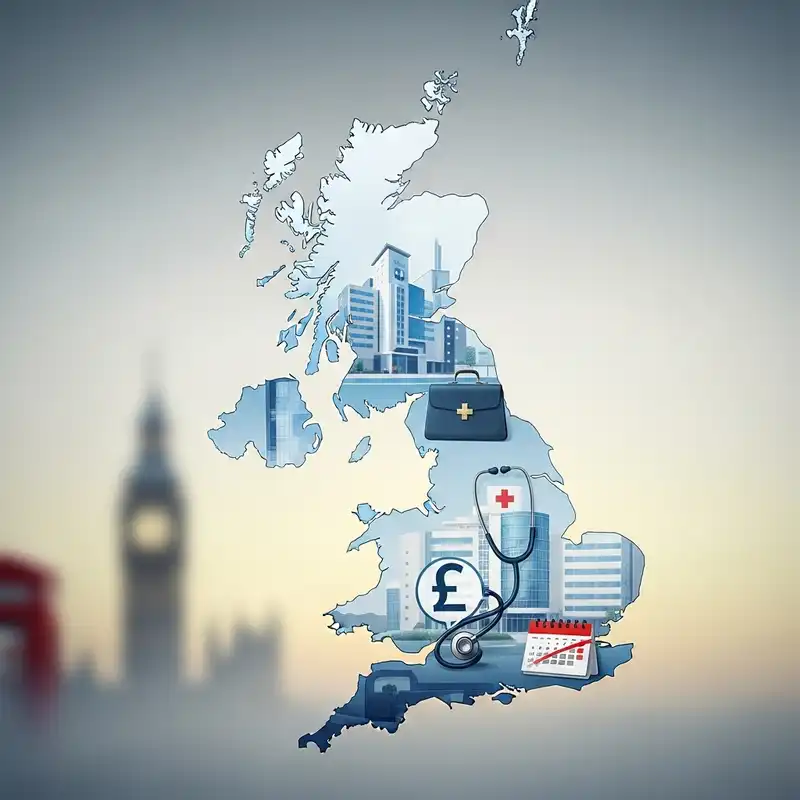Beyond Survival: Engineering Your Thriving Future

In an era where 1 in 2 people in the UK are projected to face a cancer diagnosis in their lifetime, how do you truly transcend anxiety to achieve profound personal growth? Uncover how Family Income Benefit, Income Protection, Life and Critical Illness Cover, Personal Sick Pay tailored for tradespeople, nurses, and electricians, along with strategic Life Protection and Gift Inter Vivos, are not just safety nets but the critical foundations that empower your relationships to flourish and your personal development to soar, complemented by private health insurance for swift recovery and uninterrupted progress towards your highest potential.
The statistic from Cancer Research UK is sobering. It casts a long shadow over our plans, our ambitions, and our sense of security. It’s a number that can easily breed anxiety, forcing us into a survivalist mindset where our focus narrows to simply 'getting by' and avoiding the worst. But what if we could reframe this reality? What if, instead of being a source of fear, it became the catalyst for building a life so resilient, so well-supported, that you are free to pursue your highest potential, no matter what comes your way?
This is not about ignoring the risks. It's about engineering a future where the financial fallout of a health crisis is contained, allowing you to focus your energy where it truly matters: on your recovery, your relationships, and your personal evolution. Financial protection isn't just a safety net; it's the launchpad for a thriving future. By strategically putting the right cover in place, you dismantle the single biggest source of stress during a crisis—money—and create the space for genuine growth and peace of mind.
This guide will walk you through the architecture of that financial fortress. We'll explore how each type of protection acts as a building block, creating a structure that not only protects you and your loved ones from hardship but actively empowers you to live a richer, more ambitious, and less anxious life.
The Unseen Anchor: How Financial Anxiety Stifles Growth
Before we explore the solutions, it’s crucial to understand the problem. The persistent, low-grade hum of financial anxiety—the 'what if' scenarios that play out in our minds—is a powerful inhibitor of personal growth.
- What if I can't work for six months?
- How would we pay the mortgage if I were seriously ill?
- What would happen to the children's future if I weren't around?
These questions are not just fleeting worries; they are anchors that weigh us down. They can prevent us from taking calculated risks, like starting a business, changing careers, or investing in our own education. The mental energy spent on worrying about potential financial catastrophe is energy that cannot be used for creativity, learning, connection, and self-improvement.
When a health crisis strikes, this anxiety intensifies tenfold. Suddenly, the abstract 'what if' becomes a stark reality. Research from organisations like Macmillan Cancer Support consistently highlights the "financial toxicity" of a serious illness diagnosis. The costs aren't just medical; they include lost income, travel to appointments, home modifications, and extra childcare. The stress of managing this alongside treatment can be overwhelming, hindering recovery and straining relationships to breaking point.
To truly thrive, you must first cut this anchor loose.
The Bedrock of Your Fortress: Critical Illness Cover
Critical Illness Cover (CIC) is designed to tackle the financial shock of a serious diagnosis head-on. It pays out a tax-free lump sum if you are diagnosed with one of the specific conditions listed in your policy.
While policies vary between insurers, they typically cover major illnesses such as:
- Most types of cancer
- Heart attack
- Stroke
- Multiple sclerosis
- Major organ transplant
- Parkinson's disease
How It Empowers You:
Imagine receiving a diagnosis. Your immediate focus should be on your health and treatment plan. A CIC payout removes the immediate financial panic. This lump sum is yours to use as you see fit, providing a powerful sense of control when other aspects of your life feel uncertain.
Common Uses of a Critical Illness Payout:
- Clear the Mortgage: Removing your single largest monthly expense provides immense and immediate relief.
- Cover Lost Income: You or your partner can afford to take extended time off work to focus on recovery without financial pressure.
- Pay for Private Treatment: Access specialist care or treatments not readily available on the NHS, potentially speeding up your recovery.
- Adapt Your Home: Make necessary modifications, such as installing a ramp or a stairlift, to live comfortably.
- Eliminate Debt: Pay off loans, credit cards, or car finance, simplifying your financial life.
- Fund a Convalescence Trip: Invest in your well-being with a restorative break after treatment.
By neutralising the immediate financial threat, CIC doesn't just help you survive; it gives you the breathing room to recover properly and the resources to adapt your life, setting the stage for the next chapter.
Maintaining Momentum: The Power of Income Protection
While Critical Illness Cover provides a one-off lump sum for a specific event, Income Protection (IP) is designed to protect your most valuable asset: your ability to earn an income.
If you are unable to work due to any illness or injury (not just a 'critical' one), an IP policy pays you a regular, tax-free monthly income until you can return to work, retire, or the policy term ends.
Key Features of Income Protection:
| Feature | Description | Why It Matters for Growth |
|---|---|---|
| Deferred Period | The waiting period before payments start (e.g., 4, 8, 13, 26, or 52 weeks). | You align this with your employer's sick pay or savings to ensure seamless cover. |
| Level of Cover | Typically covers 50-70% of your gross monthly income. | Maintains your standard of living, preventing financial hardship and stress. |
| Definition of Incapacity | The criteria used to decide if you can claim (e.g., 'Own Occupation'). | 'Own Occupation' is the gold standard, as it pays out if you can't do your specific job. |
| Term of Policy | The length of the policy, usually set to your intended retirement age. | Provides long-term security against recurring or chronic conditions. |
Why Income Protection is a Game-Changer:
Think of IP as your personal career insurance. A prolonged absence from work due to stress, a back injury, or a period of mental ill-health can be just as financially devastating as a critical illness. IP ensures the bills are paid, the mortgage is covered, and life continues with a sense of normality.
This continuity is vital for personal development. You can focus on your recovery without the stress of watching your savings dwindle. Your relationships are protected from the strain of financial hardship. You can continue to fund your children's hobbies or your own educational courses. Income Protection ensures that a health setback doesn't derail your entire life's trajectory.
Specialised Protection for Unique Careers
A one-size-fits-all approach to financial protection doesn't work. Your profession dictates your risks and your needs.
For the Hands-On Professionals: Personal Sick Pay
Tradespeople, nurses, electricians, construction workers, and other manual professionals face a higher risk of physical injury. Furthermore, many are self-employed or work on contracts with limited sick pay entitlements. A standard IP policy with a long deferred period might not be suitable.
This is where Personal Sick Pay insurance (often a form of short-term IP) comes in. These policies are specifically designed for the risks of manual work and offer:
- Shorter Deferred Periods: You can often choose to have payments start from day one or day eight of being unable to work.
- Guaranteed Premiums: The cost won't increase over the term of the policy.
- Focus on Physical Work: The definitions of incapacity are tailored to roles where physical fitness is essential.
For a self-employed electrician, a knee injury could mean an immediate and total loss of income. Personal Sick Pay bridges that gap, ensuring they can pay their bills and protect their business while they recover, preventing a short-term injury from becoming a long-term financial disaster.
For Business Owners and Company Directors: Fortifying Your Enterprise
If you run your own business, your personal and professional finances are deeply intertwined. Protecting yourself is also about protecting the entity you've worked so hard to build.
1. Key Person Insurance
Who is indispensable to your business? Is it the top salesperson, the technical genius, or you, the founder? Key Person Insurance is a policy taken out by the business on the life or health of a crucial employee.
If that key person were to pass away or suffer a critical illness, the policy pays a lump sum to the business. This money can be used to:
- Recruit and train a replacement.
- Cover lost profits during the disruption.
- Reassure lenders and investors.
- Repay a director's loan.
By securing your business against this risk, you free yourself from the anxiety of it all collapsing. This security allows you to lead with vision and confidence, knowing that a personal tragedy for one individual won't automatically mean a corporate one for everyone else.
2. Executive Income Protection
This is an Income Protection policy that is owned and paid for by your limited company on your behalf. It's a highly tax-efficient way to protect your personal income.
- Tax Efficiency: The premiums are typically considered an allowable business expense, so they can be offset against your corporation tax bill.
- No P11D Benefit: It's not usually treated as a 'benefit in kind', so there's no extra personal tax to pay.
- Robust Cover: These policies often offer higher levels of cover than personal plans.
For a company director, this is a smart strategic move. It uses company funds to provide personal protection, safeguarding your family's lifestyle while also being a tax-deductible business cost. This sophisticated planning is a hallmark of a leader who is thinking beyond mere survival and actively engineering long-term stability.
At WeCovr, we specialise in helping directors and business owners navigate these options. We can compare executive and personal plans from across the market to find the most efficient and effective solution for your unique circumstances.
Building a Legacy: Life Insurance and Strategic Gifting
Protecting your future is also about securing the future of those you love. This is where life insurance becomes a profound tool for personal peace of mind and legacy building.
The Core Protectors: Term Life Insurance and Family Income Benefit
Term Life Insurance is the most common form. You choose an amount of cover and a term (e.g., £250,000 over 25 years to match your mortgage). If you pass away within that term, your beneficiaries receive the lump sum. It's simple, affordable, and highly effective for covering major debts and providing for your family's future.
Family Income Benefit (FIB) works slightly differently. Instead of a single lump sum, it pays out a regular, tax-free monthly or annual income to your family until the end of the policy term.
Why Choose FIB?
| Feature | Term Life Insurance (Lump Sum) | Family Income Benefit (Income Stream) |
|---|---|---|
| Payout | Single, large tax-free lump sum. | Regular, tax-free income payments. |
| Best For | Clearing large debts like a mortgage. | Replacing a lost salary for ongoing family costs. |
| Management | Beneficiaries must manage and invest a large sum. | Simpler budgeting for the surviving partner. |
| Cost | Generally more expensive for the same total payout. | Often more affordable, especially for younger families. |
Knowing that your family's lifestyle and your children's opportunities would be secure in your absence is a powerful antidote to anxiety. It frees you to live more fully in the present, take professional risks, and pursue your passions, confident that you have fulfilled your ultimate responsibility to your loved ones.
Advanced Legacy Planning: Gift Inter Vivos Insurance
For those with significant assets, planning for Inheritance Tax (IHT) is a key part of legacy building. Currently, when you gift a large sum of money or an asset (like a property) to someone, it is considered a Potentially Exempt Transfer (PET). If you survive for seven years after making the gift, it falls outside of your estate for IHT purposes.
However, if you pass away within those seven years, the gift becomes chargeable to IHT on a sliding scale. This can create an unexpected and substantial tax bill for the person you were trying to help.
Gift Inter Vivos insurance is the solution. It is a specialised life insurance policy designed to cover this potential IHT liability. The policy runs for seven years, and the amount of cover reduces over time, mirroring the decreasing tax liability.
This isn't just a financial product; it's an act of deep consideration. It ensures your gift is received in full, without creating a new financial burden for your loved ones. This level of meticulous planning demonstrates a commitment not just to giving, but to giving well—a cornerstone of a thoughtfully constructed legacy.
The Accelerator: How Private Health Insurance Fuels Your Progress
If protection policies are the foundation, Private Health Insurance (PMI) is the accelerator for your personal growth journey. While the NHS provides exceptional emergency and critical care, it is currently facing significant pressure, leading to long waiting lists for diagnostics and elective treatments.
According to the latest NHS England data, millions of people are waiting for consultant-led hospital treatment. These delays can mean months of living with pain, uncertainty, and a reduced quality of life, putting your career, hobbies, and personal goals on hold.
PMI allows you to bypass these queues. It provides prompt access to:
- Private consultations with specialists.
- Advanced diagnostic scans like MRI and CT.
- Treatment and surgery in a private hospital.
- A private room for a more comfortable recovery.
- Access to breakthrough drugs and therapies not yet approved for NHS use.
For someone on a path of personal development, time is the most precious commodity. PMI buys you time. A knee problem that might take 12 months to resolve via the NHS could be diagnosed and operated on within weeks through a private route. This is the difference between a year of frustration and a swift return to your active life, your career, and your ambitions. It ensures that a treatable condition doesn't become a long-term roadblock to your progress.
The Holistic Approach: Integrating Financial and Personal Well-being
Building a thriving future isn't solely about insurance policies. It's about creating a holistic ecosystem where your financial, physical, and mental health support one another.
- Nourish Your Body: A balanced diet rich in whole foods is fundamental to both physical and mental resilience. Reducing processed foods, sugar, and excessive alcohol can have a profound impact on your energy levels and mood.
- Prioritise Sleep: Quality sleep is non-negotiable for cognitive function, emotional regulation, and physical recovery. Aim for 7-9 hours per night in a cool, dark, and quiet room.
- Move Your Body: Regular physical activity is one of the most powerful anti-anxiety tools available. Whether it's walking, running, yoga, or weight training, find something you enjoy and make it a consistent part of your routine.
- Cultivate Mindfulness: Practices like meditation and deep breathing can help you manage the stress of daily life and the anxiety of 'what if'. They train you to observe your thoughts without being controlled by them.
This is why at WeCovr, we believe in supporting our clients beyond the policy documents. As a thank you for trusting us with your protection, we provide our customers with complimentary access to our proprietary AI-powered calorie and nutrition tracking app, CalorieHero. It's a small way we can help you invest in your day-to-day well-being, which is the ultimate foundation for a long, healthy, and prosperous life.
Putting It All Together: Your Personal Blueprint for Thriving
The prospect of a serious illness is daunting, but it doesn't have to define your life or limit your ambitions. By proactively engineering a fortress of financial protection, you transform anxiety into empowerment.
- Critical Illness Cover acts as your financial first responder, neutralising the immediate shock.
- Income Protection maintains your life's momentum, ensuring your income and lifestyle are secure.
- Life Insurance and Family Income Benefit create a lasting legacy of care for your loved ones.
- Specialised policies like Personal Sick Pay and Executive IP address your unique professional needs.
- Gift Inter Vivos ensures your generosity is a blessing, not a burden.
- Private Health Insurance accelerates your recovery, protecting your precious time.
This isn't about morbid planning. It's about intelligent, optimistic, and empowering self-care. It's about making a conscious decision to move beyond a mindset of mere survival. It is the practical, foundational work that gives you the unwavering confidence to pursue your grandest goals, strengthen your most important relationships, and unlock your profound personal growth. You are not just buying a policy; you are investing in the freedom to thrive.
The journey starts with a simple conversation. A specialist adviser, like the team here at WeCovr, can help you assess your unique situation, understand your goals, and search the entire UK market to build a protection portfolio that is perfectly tailored to you. It's the first and most critical step in engineering the thriving future you deserve.
Do I really need all these different types of insurance?
Isn't Income Protection just for the self-employed?
I have savings. Why do I need Critical Illness Cover?
Are insurers reliable? I've heard they don't pay out.
How much does this kind of protection cost?
Related guides
Why life insurance and how does it work?
What is Life Insurance?
Life insurance is an insurance policy that can provide financial support for your loved ones when you or your joint policy holder passes away. It can help clear any outstanding debts, such as a mortgage, and cover your family's living and other expenses such costs of education, so your family can continue to pay bills and living expenses. In addition to life insurance, insurance providers offer related products such as income protection and critical illness, which we will touch upon below.How does it work?
Life insurance pays out if you die. The payout can be in the form of a lump sum payment or can be paid as a replacement for a regular income. It's your decision how much cover you'd like to take based on your financial resources and how much you'd like to leave to your family to help them deal with any outstanding debts and living expenses. Your premium depends on a number of factors, including your occupation, health and other criteria.The payout amount can change over time or can be fixed. A level term or whole of life policy offers a fixed payout. A decreasing term policy offers a payout that decreases over the term of the cover.
With critical illness policies, a payout is made if you’re diagnosed with a terminal illness with a remaining life expectancy of less than 12 months. While income protection policies ensure you can continue to meet your financial commitments if you are forced to take an extended break from work. If you can’t work because you’ve had an accident, fallen sick, or lost your job through no fault of your own, income protection insurance pays you an agreed portion of your salary each month.
Income protection is particularly helpful for people in dangerous occupations who want to be sure their mortgage will always be covered. Income protection only covers events beyond your control: you’re much less likely to be covered if you’re fired from your job or if you injure yourself deliberately.
Questions to ask yourself regarding life insurance
Just ask yourself:👉 Who would pay your mortgage or rent if you were to pass away or fall seriously ill?
👉 Who would pay for your family’s food, clothing, study fees or lifestyle?
👉 Who would provide for the costs of your funeral or clear your debts?
👉 Who would pay for your costs if you're unable to work due to serious illness or disability?
Many families don’t realise that life, income protection and critical illness insurance is one of the most effective ways to protect their finances. A great insurance policy can cover costs, protect a family from inheriting debts and even pay off a mortgage.
Many would think that the costs for all the benefits provided by life insurance, income protection insurance or critical illness insurance are too high, but the great news is in the current market policies are actually very inexpensive.
Benefits offered by income protection, life and critical illness insurance
Life insurance, income protection and critical illness insurance are indispensable for every family because a child loses a parent every 22 minutes in the UK, while every single day tragically 60 people suffer major injuries on the UK roads. Some people become unable to work because of sickness or disability.Life insurance cover pays out a lump sum to your family, loved ones or whomever you choose to get the money. This can be used to secure the financial future of your loved ones meaning they would not have to struggle financially in the event of your death.
If it's a critical illness cover, the payout happens sooner - upon diagnosis of a serious illness, disability or medical condition, easing the financial hardship such an event inevitably brings.
Income protection insurance can be very important for anyone who relies on a pay check to cover their living costs, but it's especially important if you’re self-employed or own a small business, where your employment and income is a bit less stable. It pays a regular income if you can't work because of sickness or disability and continues until you return to paid work or you retire.
In a world where 1 in 4 of us would struggle financially after just four weeks without work, the stark reality hits hard – a mere 7% of UK adults possess the vital shield of income protection. The urgency of safeguarding our financial well-being has never been more palpable.
Let's face it – relying on savings isn't a solution for everyone. Almost 25% of people have no savings at all, and a whopping 50% have £1,000 or less tucked away. Even more concerning, 51% of Brits – that's a huge 27 million people – wouldn't last more than one month living off their savings. That's a 10% increase from 2022.
And don't even think about state benefits being a safety net. The maximum you can expect from statutory sick pay is a mere £109.40 per week for up to 28 weeks. Not exactly a financial lifeline, right?
Now, let's tackle a common objection: "But I have critical illness insurance. I don't need income protection too." Here's the deal – the two policies apply to very different situations. In a nutshell:
- Critical illness insurance pays a single lump sum if you're diagnosed with or undergo surgery for a specified potentially life-threatening illness. It's great for handling big one-off expenses or debts.
- Income protection, on the other hand, pays a percentage of your salary as a regular payment if you can't work due to illness or injury. It's the superhero that tackles those relentless monthly bills.
Types of life insurance policies
Common reasons for getting a life insurance policy are to:✅ Leave behind an amount of money to keep your family comfortable
✅ Protect the family home and pay off the mortgage in full or in part
✅ Pay for funeral costs
Starting from as little as a couple of pounds per week, you can do all that with a Life Policy.
Level Term Life Insurance
One of the simplest forms of life insurance, level term life insurance works by selecting a length of time for which you would want to be covered and then deciding how much you would like your loved ones to receive should the worst happen. Should your life insurance policy pay out to your family, it would be in a lump sum amount that can be used in whatever way the beneficiary may wish.
Decreasing Term Life Insurance
Decreasing term life insurance works in the same way as level term, except the lump sum payment amount upon death decreases with time. The common use for decreasing term life cover is to protect against mortgage repayment as the lump sum decreases along with the principal of the mortgage itself.
Increasing Term Life Insurance
Increasing term life insurance aims to pay out a cash sum growing each year if the worst happens while covered by the policy. With increasing term life cover amount insured increases annually by a fixed amount for the length of the policy. This can protect your policy's value against inflation, which could be advantageous if you’re looking to maintain your loved ones’ living standards, continue paying off your mortgage in line with its repayment schedule and cover your children’s education fees.
Whole of Life Insurance
Whereas term life insurance policies only pay out if you pass away during their term, whole of life insurance pays out to your beneficiaries whenever this should happen. The most common uses for whole life insurance are to cover the costs of a funeral or as a vehicle for your family's inheritance tax planning.
Family Income Benefit
Family income benefit is a somewhat lesser-known product in the family of life insurance products. Paying out a set amount every month of year to your beneficiaries, it is the most cost-effective way of maintaining your family's living standards to an age where you'd expect them to be able to support themselves financially. The most common use would be for a family with children who are not working yet so are unable to take care of themselves financially.
Relevant Life Insurance
Relevant Life Insurance is a tax-efficient policy for a director or single employee. A simple level term life insurance product, it is placed in a specific trust to ensure its tax efficiency. The premiums are tax deductible and any benefit payable should a claim arise is also paid out tax free, which makes it an attractive product for entrepreneurs and their businesses.
Important Fact!
We can look at a more suitable option mid-term!
Why is it important to get life insurance early?
👉 Many people are very thankful that they had their life, income protection, and critical illness insurance cover in place before running into some serious issues. Critical illness and income protection insurance is as important as life insurance for protecting your family's finances.👉 We insure our cars, houses, bicycles and even bags! Yet our life and health are the most precious things we have.
Easily one of the most important insurance purchases an individual or family can make in their lifetime, the decision to buy life, income protection, critical illness and private medical health insurance can be made much simpler with the help of FCA-authorised advisers. They are the specialists who do the searching and analysis helping people choose between various types of life insurance policies available in the market, including income protection, critical illness and other types of policies most suitable to the client's individual circumstances.
It certainly won't do any harm if you speak with one of our experienced FCA-authorised insurance partner experts who are passionate about advising people on financial matters related to life insurance and are keen to provide you with a free consultation.
You can discuss with them in detail what affordable life, income protection, critical illness or private medical health insurance plan for the necessary peace of mind they would recommend! WeCovr works with some of the best advisers in the market.
By tapping the button below, you can book a free call with them in less than 30 seconds right now:
Our Group Is Proud To Have Issued 900,000+ Policies!
We've established collaboration agreements with leading insurance groups to create tailored coverage
























How It Works
1. Complete a brief form

2. Our experts analyse your information and find you best quotes

3. Enjoy your protection!

Any questions?
Learn more

Who Are WeCovr?
WeCovr is an insurance specialist for people valuing their peace of mind and a great service.👍 WeCovr will help you get your private medical insurance, life insurance, critical illness insurance and others in no time thanks to our wonderful super-friendly experts ready to assist you every step of the way.
Just a quick and simple form and an easy conversation with one of our experts and your valuable insurance policy is in place for that needed peace of mind!




